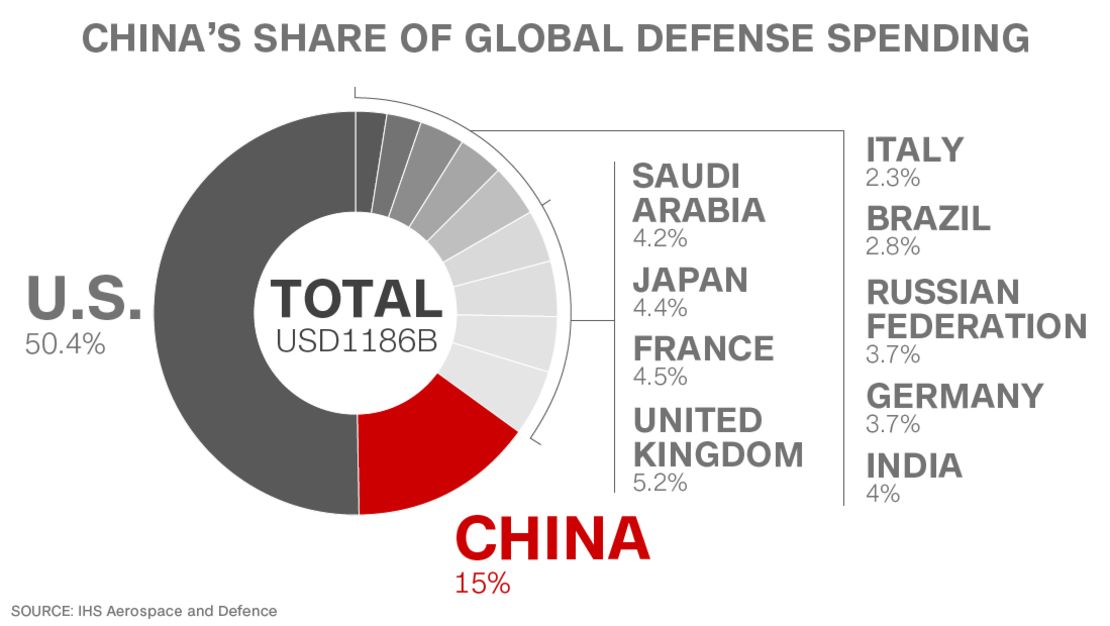Story highlights
China says its military spending will increase by 10.1% in 2015
China prioritizing military spending even as economic growth slows
Spending likely to focus on China's naval force
China says its military budget will increase by 10.1% in 2015, the latest in a series of double-digit increases that will narrow the still-significant gap with the United States on defense spending.
According to a budget report released at the start of China’s National People’s Congress - the annual meeting of the country’s rubber stamp parliament – defense spending will total 887 billion yuan ($144.2 billion) this year.
“Building a solid national defense and strong armed forces is fundamental to safeguarding China’s sovereignty,” Premier Li Keqiang told thousands of delegates gathered in the cavernous Great Hall of the People in Beijing’s Tiananmen Square.
READ: National People’s Congress: What you need to know
The increase underscores China’s intention to prioritize military spending even as economic growth slows.
It also comes amid unease among China’s neighbors about the pursuit of its territorial claims in the South China Sea and East China Sea.
READ: China building new islands in disputes waters
Traditionally, the People’s Liberation Army army has been focused on protecting its own borders, but recent missions have seen it join U.N. peacekeeping efforts in places like South Sudan, and fighting piracy in Somalia.
Opaque
Analysts say that China’s spending on defense is notoriously opaque and the budget includes paramilitary forces such as the People’s Armed Police as well as the People’s Liberation Army, Navy and Air Force.
Paul Burton, Asia Pacific director at IHS Aerospace, Defence & Security, estimates that actual spending is 35% higher than the announced budget.
“China’s expanding strategic reach and extensive modernization requirements will continue to require significant investment over the next decade,” Burton said.
China’s defense budget is still dwarfed by what the U.S. spends on its military – $598 billion, according to 2014 figures provided by IHS. But, while China’s budget has increased by double digits every year since 2010, U.S. spending has declined since then.
China’s defense budget grew by 12.7% in 2011, 11.2% in 2012, and 10.7% in 2013, according to China’s state news agency Xinhua.

Naval power
Alexander Neill, a senior fellow at the International Institute of Strategic Studies in Singapore says China is likely to prioritize spending on its naval power – its force has traditionally been focused on winning land battles.
“A growing chunk of budget is going toward China’s navy, particularly its submarine force and its seaborne nuclear deterrent,” he said.
China’s first aircraft carrier went into service in 2012 and a second is thought to be under construction.
Neill also said that the PLA is likely to make its pay more competitive to attract higher quality recruits, such as college graduates.
A U.S. congressional report released last month said that many are still drawn from rural areas with limited education.
It added that the country’s one-child policy, which has created the “little emperor” phenomenon of spoiled children, produces recruits who “may not be tough enough to withstand military discipline,” the report added.
“Serving in the military, in a Chinese cultural sense, is not a sought-after professional career,” Neill said.
“If the PLA can offer competitive salaries, they may be able to attract a new stratum of specialist talent.”
READ: China’s military not ready ‘to fight and win future wars’
CNN’s Jason Kwok designed the graphics in this report.












